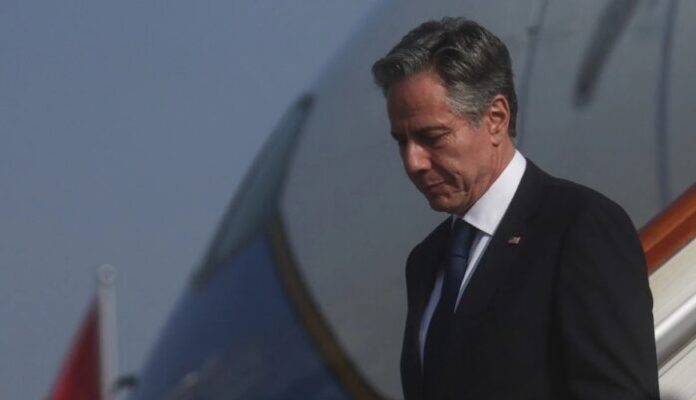| Translate This News In |
|---|
The highest-level visit by a US official to China in almost five years began on Sunday with Secretary of State Antony Blinken’s arrival, as the competing powers sought to defuse escalating tensions.
Since the two greatest economies in the world disagree on a range of topics, including trade, technology, and regional security, neither side expects any major breakthroughs during Blinken’s two-day visit.
The two nations, however, have shown a growing desire for more stability and believe that there is a limited window before elections in both Taiwan and the United States, a self-governing democracy that Beijing has not ruled out annexing by force.
Presidents Joe Biden and Xi Jinping had a friendly summit in Bali in November, and as a result, Blinken had been scheduled to come four months earlier. This was a sign of how frail the endeavour was at the time.
But after the US claimed to have found a Chinese surveillance balloon over US territory, Blinken abruptly postponed the trip, inciting outraged demands for action from hardliners in Washington.
Before leaving, Blinken gave a speech in the US capital in which he stated that he would try to “responsibly manage our relationship” by figuring out how to stop “miscalculations” between the nations.
In order to prevent confrontation or war, he added, “intense competition requires sustained diplomacy.”
Keeping friends close
Blinken was on the same panel as Singapore’s foreign minister, Vivian Balakrishnan, who stated that the area wants the United States to continue to be a superpower while also figuring out how to live side by side with a developing China.
According to Balakrishnan, Blinken’s journey “is necessary, but not sufficient.”
“The viewpoint and values are fundamentally different. The development of strategic trust and mutual respect also takes time.
Blinken spoke on the phone with his counterparts from South Korea and Japan throughout his 20-hour trans-Pacific voyage as part of the Biden administration’s emphasis on maintaining close ties with allies.
Jake Sullivan, Biden’s national security adviser, travelled alone to Tokyo for separate three-way talks involving Japan, South Korea, and the Philippines.
In recent months, the United States has agreed to send troops to the northern and southern Philippines, both of which are strategically near to Taiwan.
After Nancy Pelosi, the then-Speaker of the US House of Representatives, arrived, Beijing conducted extensive military exercises around Taiwan in August, which were perceived as a preparation for an invasion.
Additionally, in April, China began three days of military exercises after Taiwanese President Tsai Ing-wen visited the US and met Kevin McCarthy, the current speaker, during her tour.
“Core concerns” of China
Before Blinken’s visit, Wang Wenbin, a spokeswoman for the Chinese foreign ministry, stated that Washington has to “respect China’s core concerns” and cooperate with Beijing.
After Mike Pompeo’s brief visit to Beijing in 2018, who later advocated for an all-out confrontation with China in the closing years of Donald Trump’s presidency, Blinken is the highest-ranking US diplomat to travel to Beijing since that time.
In practise, if not in tone, the Biden administration has maintained Trump’s tough stance and gone even further in some instances, such as seeking to forbid the sale of expensive semiconductors with military applications to China.
However, the Biden administration has stated that it is open to engage with China on certain areas of collaboration, such as environment, in contrast to Trump, who is running for president again. This comes as Beijing swelters in record-breaking mid-June temperatures.
During Barack Obama’s second term, Danny Russel, who was in charge of all diplomatic relations with East Asia, noted that each side had priorities, with China hoping to avoid further US technology restrictions or support for Taiwan and the US hoping to avert an incident that could lead to a military conflict.
In the US-China relationship, neither the major nor necessarily the minor concerns will be resolved by Blinken’s quick visit. Russel, who is currently a vice president at the Asia Society Policy Institute, added that it won’t stop either side from continuing with their rivalry.
“But his visit may well restart desperately needed face-to-face communication and send a signal that both countries are shifting from irate press podium rhetoric to sober discussions behind closed doors,” said the author.


















